Results
-
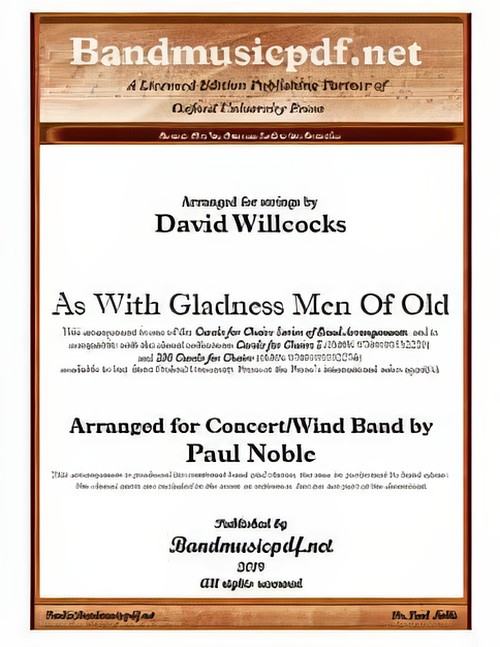 £75.00
£75.00As With Gladness Men of Old (Concert Band with Optional Choir - Score and Parts) - Noble & Willcocks
As with Gladness Men of Old is an Epiphany hymn, written by William Chatterton Dix on 6 January 1859 (Epiphany) while he was ill in bed. Though considered by many as a Christmas carol, it is found in the Epiphany section of many hymnals and still used by many churches. The music was adapted by William Henry Monk in 1861 from a tune written by Conrad Kocher in 1838. The hymn is based on the visit of the Biblical magi in the Nativity of Jesus. The hymn used Matthew 2:1-12 as a theme to compare the journey of the Biblical magi to visit the baby Jesus to each Christian's personal pilgrimage and as a reminder that it is not the value of the gifts, it is the value of giving and adoration to Jesus that is what Christians should seek. It is the only well-known Epiphany hymn or carol about the Biblical magi that avoids referring to them as either magi or kings and does not state how many there were. This arrangement represents one in the Series of Band Arrangements compatible with David Willcocks' Carols for Choirs.
Estimated dispatch 7-14 working days
-
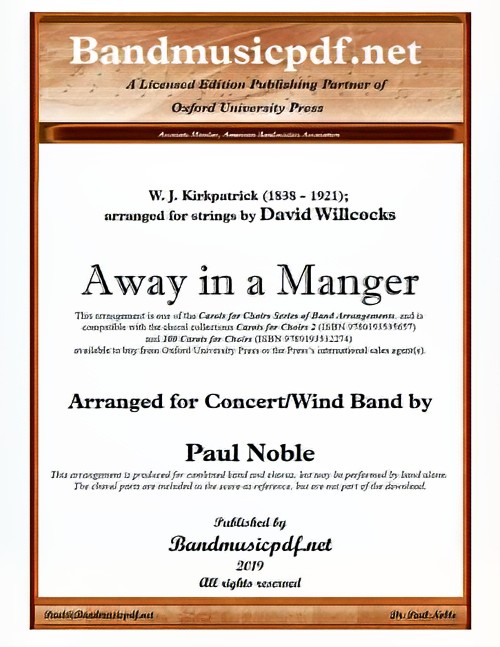 £75.00
£75.00Away in a Manger (Concert Band with Optional Choir - Score and Parts) - Kirkpatrick, William J. - Noble & Willcocks
Away in a Manger is a Christmas carol first published in the late nineteenth century and used widely throughout the English-speaking world. In Britain, it is one of the most popular carols; a 1996 Gallup Poll ranked it joint second. Although it was long claimed to be the work of German religious reformer Martin Luther, the carol is now thought to be wholly American in origin. This arrangement represents one in the Series of Band Arrangements compatible with David Willcocks' Carols for Choirs.
Estimated dispatch 7-14 working days
-
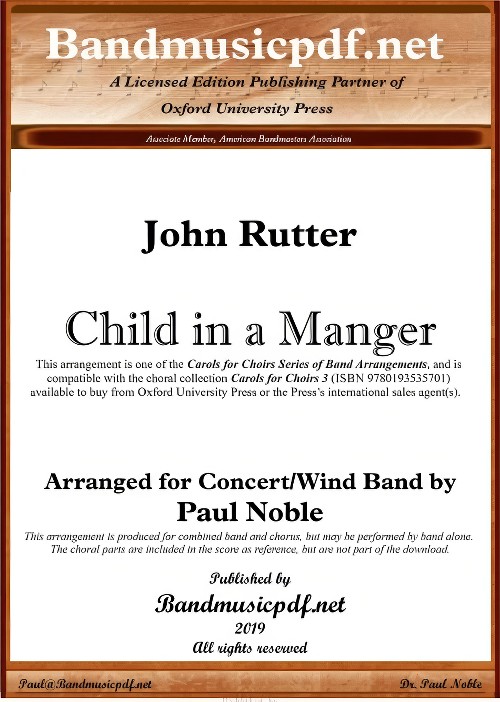 £75.00
£75.00Child in a Manger (Concert Band with Optional Choir - Score and Parts) - Rutter, John - Noble, Paul
The tune for Child in a manger first appeared as Bunessan, composed in the Scottish Islands, published in 1900 as a Christmas carol with lyrics translated from the Scottish Gaelic by Mary McDonald. The hymn tune later appeared in 'Songs of Praise', published in 1931 as Morning has Broken. This arrangement represents one in the Series of Band Arrangements compatible with David Willcocks' Carols for Choirs.
Estimated dispatch 7-14 working days
-
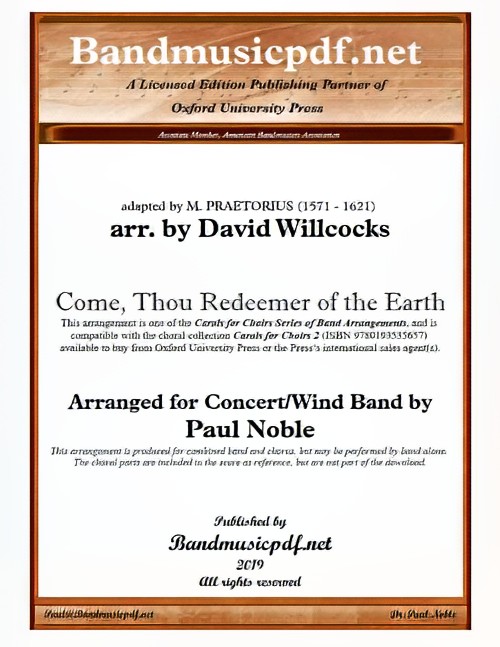 £75.00
£75.00Come, Thou Redeemer of the Earth (Concert Band with Optional Choir - Score and Parts) - Noble & Willcocks
Come, Thou Redeemer of the Earth is an Advent hymn with roots in a Latin hymn attributed to St. Ambrose of Milan (340 - 397), 'Veni Redemptor gentium.' It was translated into English by John Mason Neale in the middle of the nineteenth century and set to music from another old Latin hymn, 'Puer nobis nascitur' in the 17th century by Michael Praetorius (1571 - 1621). This arrangement represents one in the Series of Band Arrangements compatible with David Willcocks' Carols for Choirs. With eight verses (two of which may be omitted), it offers versatility in scoring, allowing the conductor to select the instrumental grouping for accompaniment as desired.
Estimated dispatch 7-14 working days
-
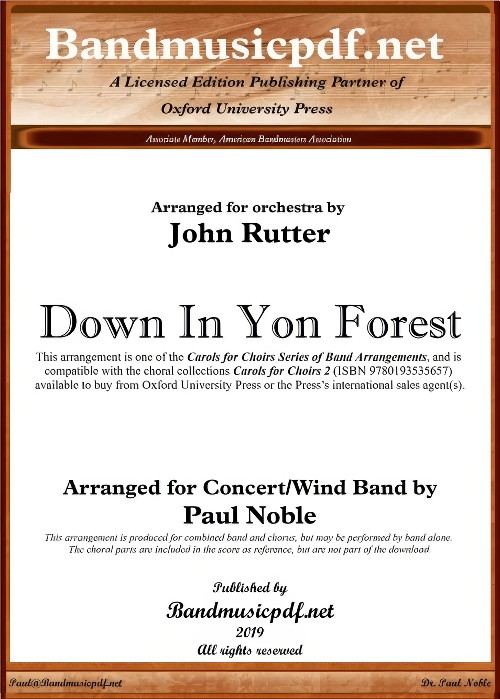 £75.00
£75.00Down in Yon Forest (Concert Band with Optional Choir - Score and Parts) - Rutter, John - Noble, Paul
Down in Yon Forest is a traditional English Christmas carol dating to the Renaissance era, ultimately deriving from the anonymous Middle English poem known today as the Corpus Christi Carol. The carol has been arranged in modern English by John Rutter. This arrangement represents one in the Series of Band Arrangements compatible with David Willcocks' Carols for Choirs.
Estimated dispatch 7-14 working days
-
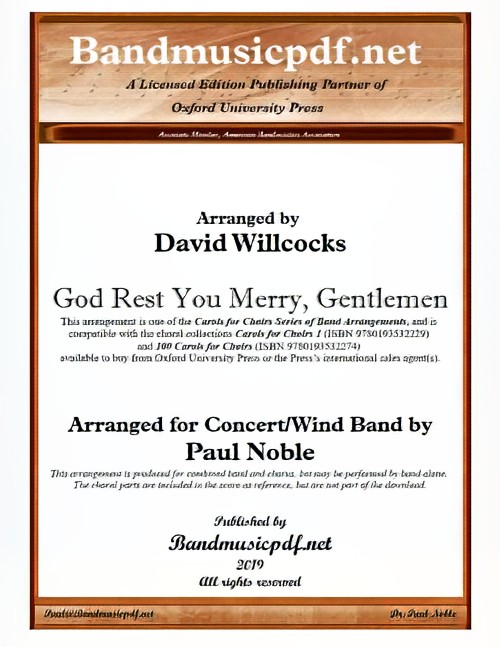 £75.00
£75.00God Rest You Merry, Gentlemen (Concert Band with Optional Choir - Score and Parts) - Noble & Willcocks
God Rest You Merry, Gentlemen is an English traditional Christmas carol. It is one of the oldest extant carols, dated to the 16th century or earlier. There are contradictory interpretations of the meaning of the phrase rest you merry at the time it was written in this carol: the verb 'rest' in the sense to keep, cause to continue to remain is typical of 16th to 17th century language. The adjective 'merry' in Early Modern English had a wider sense of pleasant; bountiful, prosperous. Some interpretations have 'merry' meaning 'mighty'. This arrangement represents one in the Series of Band Arrangements compatible with David Willcocks' Carols for Choirs.
Estimated dispatch 7-14 working days
-
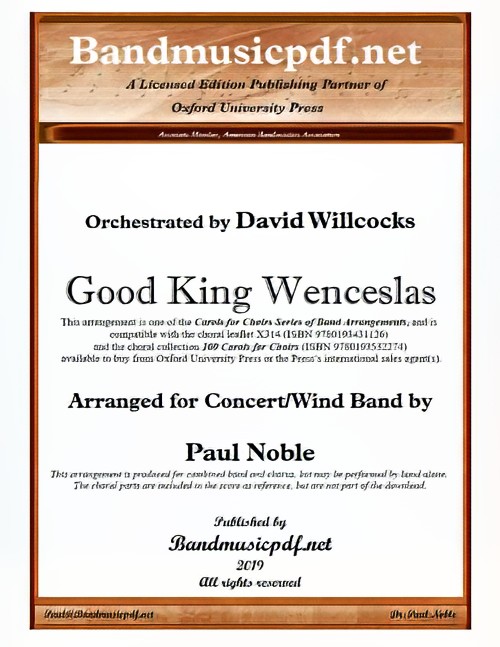 £75.00
£75.00Good King Wenceslas (Concert Band with Optional Choir - Score and Parts) - Noble & Willcocks
Good King Wenceslas is a Christmas carol that tells a story of a Bohemian king going on a journey and braving harsh winter weather to give alms to a poor peasant on the Feast of Stephen (December 26, the Second Day of Christmas). During the journey, his page is about to give up the struggle against the cold weather, but is enabled to continue by following the king's footprints, step for step, through the deep snow. The legend is based on the life of the historical Saint Wenceslaus I, Duke of Bohemia or Svat Vclav in Czech (907-935). The name Wenceslas is a Latinised version of the old Czech language Venceslav. In 1853, English hymnwriter John Mason Neale wrote the Wenceslas lyrics, in collaboration with his music editor Thomas Helmore, and the carol first appeared in Carols for Christmas-Tide, 1853. Neale's lyrics were set to the melody of a 13th-century spring carol Tempus adest floridum (The time is near for flowering) first published in the 1582 Finnish song collection Piae Cantiones. This arrangement represents one in the Series of Band Arrangements compatible with David Willcocks' Carols for Choirs.
Estimated dispatch 7-14 working days
-
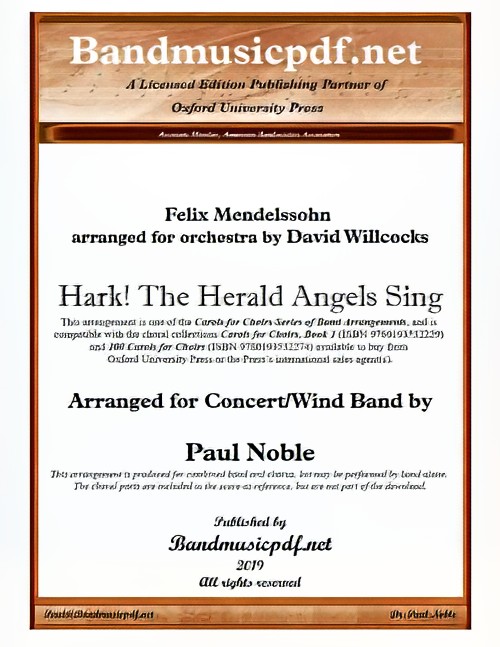 £75.00
£75.00Hark! The Herald Angels Sing (Concert Band with Optional Choir - Score and Parts) - Mendelssohn, Felix - Noble & Willcocks
Hark! The Herald Angels Sing is a Christmas carol that first appeared in 1739 in the collection Hymns and Sacred Poems. Its lyrics had been written by Charles Wesley. Inspired by the sounds of London church bells while walking to church on Christmas Day, he wrote the Hark poem about a year after his conversion to be read on Christmas Day. The popular version is the result of alterations by various hands, notably by Wesley's co-worker George Whitefield who changed the opening couplet to the familiar one, and by Felix Mendelssohn, whose melody was used for the lyrics. In 1840, a hundred years after the publication of Hymns and Sacred Poems, Mendelssohn composed a cantata to commemorate Johann Gutenberg's invention of movable type printing, and it is music from this cantata, adapted by the English musician William H. Cummings to fit the lyrics of Hark! The Herald Angels Sing, that propels the carol known today. This arrangement represents one in the Series of Band Arrangements compatible with David Willcocks' Carols for Choirs.
Estimated dispatch 7-14 working days
-
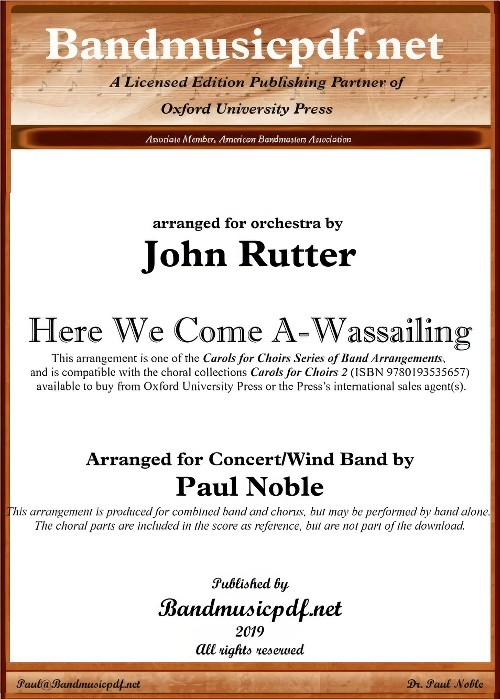 £75.00
£75.00Here We Come A-Wassailing (Concert Band with Optional Choir - Score and Parts) - Noble & Rutter
Here We Come A-wassailing (or Here We Come A-caroling) is an English traditional Christmas carol and New Year song, apparently composed c. 1850. The old English wassail song refers to 'wassailing', or singing carols door to door wishing good health, while the a- is an archaic intensifying prefix; compare A-Hunting We Will Go and lyrics to The Twelve Days of Christmas (e.g., Six geese a-laying). According to Readers Digest; the Christmas spirit often made the rich a little more generous than usual, and bands of beggars and orphans used to dance their way through the snowy streets of England, offering to sing good cheer and to tell good fortune if the householder would give them a drink from his wassail bowl or a penny or a pork pie or, let them stand for a few minutes beside the warmth of his hearth. This arrangement represents one in the Series of Band Arrangements compatible with David Willcocks' Carols for Choirs.
Estimated dispatch 7-14 working days
-
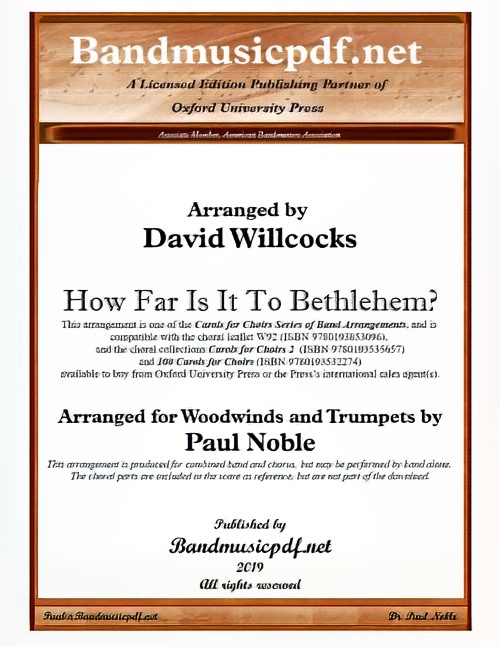 £75.00
£75.00How Far is it to Bethlehem? (Concert Band with Optional Choir - Score and Parts) - Noble & Willcocks
Written by Frances Alice Chesterton, wife of G. K. Chesterton, How far is it to Bethlehem? this carol expresses the profound longing we feel to experience firsthand the miracle of the Christmas story, not just as thinking adults, but with the wonder of children. The childlike question How far is it to Bethlehem? and the simple response Not very far begin this gentle carol. The lyrics go on to reveal the little smiles and tears that children bring as their gifts, as well as their inherent trust, as they fall asleep. This arrangement by David Willcocks is for SSA, and the instrumental accompaniment is the same voicing in groups of woodwinds and trumpets. This arrangement represents one in the Series of Band Arrangements compatible with David Willcocks' Carols for Choirs.
Estimated dispatch 7-14 working days
